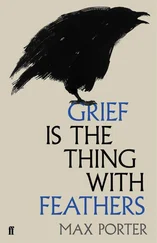But she had not grown fascinated with beans, not with roses or budgies or with the patterns made by the grain in a wood floor, though she had given all these things the most thorough consideration, and opened herself up to them, inviting them to rule her. Instead, she had straightened her hair over a period of months, sewn up the tear in her dress, and traded her acute misery for something more sensible and less exhausting, a cruel and hard sort of wisdom that said people die, and a person can do nothing against that. It’s the greatest open secret, that death will take everyone, that every person is as transient as a shadow. Embracing this knowledge, she came to realize, was how sane people managed their grief, and she thought it had served her pretty well for as long as she remained sane. It’s me it’s me it’s me , her impostor hand would write all through the winter, and all through the winter she’d reply, “How dare you say that?”
And all winter long she had terrible dreams. They featured young Dr. Woodhull, a person who was expressly not invited to invade her sleeping mind. She’d lie awake, fearing sleep as she did when she was a girl, back when nightmares were always springing out of the crevices of her agitated brain. “Not tonight,” she’d whisper, praying for dreamless sleep, or at least for the sort of dreams she used to enjoy, in which she healed the split between the New York and Boston factions of the woman suffrage movement, or in which Private Vanderbilt’s big hands closed, over and over, about her waist.
Despite her prayers, she’d find herself in the moonlit orchard, up to her ankles in rotting windfall apples and pears. She’d look up and see a child’s dress blowing in the branches of a pear tree. Dr. Woodhull would step out from a pool of darkness. “It’s a shame,” he’d say as he put his hand on her, “how it must pass away. Even something as beautiful as this.” He’d hold her breast in his two hands, lifting it up as if for her inspection, and as she watched it turned the color of ash. His touch was reverent, but everywhere it left purple blotches of rot in the shape of his hand.
“Not much room to roll around in here, is there?” he asked her in another dream. They were together in a coffin meant, like all coffins, for just a single occupant. “Why don’t they make them bigger? It’s not as if people always die one at a time.”
And in another dream, the worst, Maci stood with him looking down into her mother’s casket. Louisa Trufant was a wasted thing, shriveled away to bones, tendons, and skin by her diet of beans. But her hair was thick and shining as it had never been in life. Even as Maci watched, it grew, filling the casket until her mother seemed to be bathing in it, and indeed it made a sound like rushing water as it poured from her head. “Look,” Dr. Woodhull told her. “Look at her. Keep looking. If you keep at it she will give up a secret to you.”
Maci would wake, quieting sobs with one hand while her other pulled her across the room to the desk. We are creatures, like you , it wrote, made all of sadness and desire, only a thousand times more so. We share want like water, here. Sister, do you know how you are missed by strangers? We want to come back. Please, we want to come back.
In April of 1871, Maci went along with Tennie to Number 10 Washington Place, the home of Mr. Vanderbilt. Maci had been working on something for the Weekly , an article in support of the late Mr. Lincoln’s wife. Mrs. Lincoln , she wrote, is thrown over on the assigned ground that the widow of the murdered President is not in danger of actual starvation. We have no affection for pensions in public allowance. Every honest worker is as much a servant of the state and a public benefactor as any duly appointed official. In the case of accident or sudden death the laborer’s widow or child gets no State assistance. But if there be any such principle as public gratitude and any such way of testifying it as pension or pecuniary gratuity, Abraham Lincoln’s widow is the woman to receive it — her husband killed on account of public duty with a record, beyond the doubt of selfish motive — if that be not a claim on the nation’s bounty, what is?
It was typical of Mrs. Woodhull’s new direction. She had been courting the labor movement for months, and had instructed Maci to write pieces favorable to it. Maci complied as best she could, but always she found herself writing articles that endorsed the perspectives of the working class while simultaneously rejecting them. Maci thought it ill-advised for the Weekly to embrace Communists. She tried to tell this to Mrs. Woodhull, but the lady was dogged in her conviction that Communists, like Free Lovers and Spiritualists, were all decent and righteous and good.
The article was giving Maci a headache when Tennie came by and offered to take her away to visit the Commodore, a benefactor and intimate friend. Tennie had offered before to take Maci to his house, but Maci had always declined, because she was certain there would be a great awkwardness involved in visiting the father of the man she’d practically married in her imagination. But that day in April, Maci went because small, peculiar George Washington Woodhull was still sneaking into her dreams, bringing her strange gifts now: a lump of cold iron, a double handful of ashes, a bouquet of broken glass flowers. She wanted to drive him away, and she thought a visit to the Vanderbilt house might help to do it.
Her left hand denied coincidence, maintaining that it was a sign that Tennie was cozy with the Private’s father. It was clear to Maci that the relationship was not exactly a coincidence, but it wasn’t a magical arrangement, either. Mrs. Woodhull had told how she had sought out Commodore Vanderbilt when she’d first arrived in the city. She’d given him advice, that she claimed to have from the spirits, on the future behavior of certain stocks. He’d repaid her in kind, and she’d built her fortune on those first stock tips. “We’re kindred souls,” Mrs. Woodhull claimed of the Commodore, but it was her sister to whom he’d proposed marriage, and who had rejected him. “Marriage is the grave of love,” Tennie said simply, when Maci asked why she hadn’t accepted his offer. At Number 10 Washington Place a winking servant let them in a back door and led them through the house.
In a study full of empty bookshelves, Maci and Tennie had a visit with Mr. Vanderbilt. He greeted Maci in a very cordial manner, but soon grew cold when it became clear to him that she would not sit on his lap. Tennie did sit there, and they smoked from the same cigar, and drank whiskey. Their intimacy was routine and not shocking to Maci, who laughed now when she thought how she had been shocked by her father’s behavior towards Miss Suter. Maci pretended to sip from a glass of wine while she stared at Mr. Vanderbilt, looking for his son in him but not finding him there. She’d heard it said that a bride could look to her husband’s father to see the man with whom she’d spend her old age, and as she sat listening to Tennie and Mr. Vanderbilt talking of the virtues of cigars, she tried to imagine being old with someone who looked like this, a man with giant white whiskers, a hard face, and hawkish eyes. She failed at it. He was too coarse and grabby. All she could think was how her frail old bones and papery skin would never withstand his pinching and poking.
“I’ll show you around the house, Maci,” Tennie said suddenly, sliding off Mr. Vanderbilt’s lap. She kissed his cheek and said, “You don’t mind, do you, old goat?” She didn’t wait for his answer, but took Maci’s hand and led her out into the dark hall.
“We must be quiet,” she said. “If we wake Frank we might be sorry for it.” Frank was the new Mrs. Vanderbilt, the daughter of the lady whom Mr. Vanderbilt’s surviving children had put forth, after their mother’s death, as an acceptable bride. She was the lady he’d settled for when Tennie refused him. Maci followed Tennie as she tiptoed down the hall to a staircase, which she ascended in slow, cautious steps, pausing every now and then as if to listen for sounds of alarm.
Читать дальше












